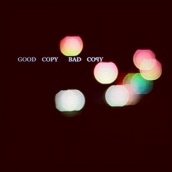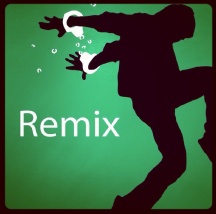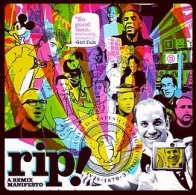Remix Culture
[home]
Remix culture is a term based on Lawrence Lessig's Remix book to describe a society which allows and encourages derivative works.
Films are considerate as one of the examples of 'Remix'. Most movies that came out in the past few years are adaptations of comics, graphic novels, books, or other forms of media. These types of movies hardly appear original and creative, because they rely on adapting material from previous works, which is a form of remix. Most widely known examples are Marvel Movies - movies that were based on the Marvel comics that came out in 20th century. Spider Man, Iron Man, Captain America and so on.
Music, of course. This type of 'Remix' usually referred to as sampling. And in music making this is a prime example of reuse and remix to produce a new work. By taking a sample or small clip of an existing song and distorting and incorporating into a new piece, the artist has remixed the song and made it their own.Although this is questionable whether remixing makes music sample belong to the new author. Copyright plays a huge role in this case. I'd say it's the trickiest one to get around, specially in our day and age.
Other great example is Graffiti and Street Art. The example of 'Read & Write' culture where the participants interact with their surroundings and environment By using spray paint, or other mediums, the artists essentially remix and change the wall or other surface to display their twist or critique.
Works shown above belong to very famous and influential artist known as Banksy.
[useful stuff]
Machinima (muh-sheen-eh-mah) is filmmaking within a real-time, 3D virtual environment, often using 3D video-game technologies.
In an expanded definition, it is the convergence of filmmaking, animation and game development. Machinima is real-world filmmaking techniques applied within an interactive virtual space where characters and events can be either controlled by humans, scripts or artificial intelligence.
By combining the techniques of filmmaking, animation production and the technology of real-time 3D game engines, Machinima makes for a very cost- and time-efficient way to produce films, with a large amount of creative control.
► http://www.machinima.org/machinima-faq.html
► http://www.machinima.com/
► http://www.youtube.com/user/machinima#g/u
Good Copy Bad Copy, A documentary about the current state of copyright and culture, is a documentary about copyright and culture in the context of Internet, peer-to-peer file sharing and other technological advances, directed by Andreas Johnsen, Ralf Christensen, and Henrik Moltke.
It features interviews with many people with various perspectives on copyright, including copyright lawyers, producers, artists and filesharing service providers.
A central point of the documentary is the thesis that "creativity itself is on the line" and that a balance needs to be struck, or that there is a conflict, between protecting the right of those who own intellectual property and the rights of future generations to create.
► http://www.goodcopybadcopy.net/

Lawrence Lessig is the Director of the Edmond J. Safra Foundation Center for Ethics at Harvard University, and a Professor of Law at Harvard Law School.
For much of his academic career, Lessig has focused on law and technology, especially as it affects copyright. He is the author of five books on the subject — Remix (2008), Code v2 (2007), Free Culture (2004), The Future of Ideas (2001) and Code and Other Laws of Cyberspace (1999) — and has served as lead counsel in a number of important cases marking the boundaries of copyright law in a digital age, including Eldred v. Ashcroft, a challenge to the 1998 Sonny Bono Copyright Term Extension Act, and Golan v. Holder.
► http://www.lessig.org/
► http://www.youtube.com/watch?v=7Q25-S7jzgs
► http://twitter.com/lessig


Created over a period of six years, the documentary film features the collaborative remix work of hundreds of people who have contributed to the Open Source Cinema website, helping to create the "world's first open source documentary" as Gaylor put it. The project's working title was Basement Tapes,but it was renamed RiP!: A Remix Manifesto prior to theatrical release. Gaylor encourages more people to create their own remixes from this movie, using media available from the Open Source Cinema website, or other websites like YouTube, Flickr, Hulu, or MySpace.
► http://ripremix.com/
► http://remixtheory.net/?page_id=2